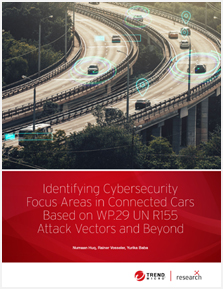The arrival of 5G has enabled vehicles to become more connected than ever. In order to allow this evolution to manifest safely, the UNECE World Forum for Harmonization of Vehicle Regulations (WP.29) introduced the United Nations Regulation No. 155 this past January, with expectations for more than 54 country to adhere to the mandate starting in July 2022.
This regulation provides 69 attack vectors that manufacturers are required to secure, although it does not include specific countermeasures. Security methods and corresponding technologies change with time, and are often influenced by evolving connected car technologies as well as the threat landscape. Implementing effective cybersecurity means conducting a thorough risk analysis and prioritizing what needs to be achieved.
In this research paper, we conducted a risk analysis on each of the 69 attack vectors from a current and future perspective. In addition, we went beyond the WP.29 regulation and its defined attack vectors. Using our own analysis and insights, we brought into attention other considerations that were outside the scope of UN-R155 and recommended an overall security approach.
We encourage you to use this research to effectively prioritize how you address these attack vectors and other identified threats.
Register for this exclusive white paper and receive:
- A look into current connected car ecosystems and how they will evolve with the arrival of 5G.
- Expert risk analysis and insight into 69 attack vectors listed on the UN R155 by WP.29.
- Our forecast on how the risk levels of the 69 attack vectors will evolve in the future, along with a breakdown of our predictions.
- The top five attack vectors the automotive industry should focus on, based on our risk analysis.
- Additional attack vectors, along with the identified 69, that should also be given consideration.
- Guidelines and recommended approaches for protecting connected cars.

Trend Micro guards your privacy: Read our privacy policy.